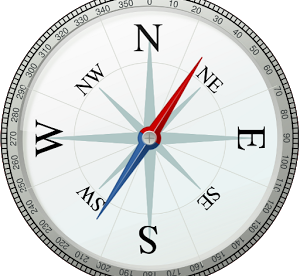The People That Have No Rights

For most of us, the world surrounding us would be hard to talk about if we didn’t place ourselves in the center of it all. That’s not a statement of morals or of ego, either — it’s a reflection on our language. We speak about how things are to our left or right, are in front of us or behind us, or are up or down (or above/beneath) us. All these directional indicators are centered on us: they are all relative to where we are and which way we are facing. At times, that can be confusing — something to my right will be to your left if we are facing one another, for example. But on the other hand, using relative directions is probably more convenient than using cardinal directions — north, south, east, west. Could we function without using self-centered direction?
It turns out, we probably could. And we know this because some cultures do exactly that — in their languages, there are no words for “right,” “left,” etc. and instead, they use “north,” “south,” and the like.
The most notable culture here is the Guugu Yimithirr, an aboriginal people in the upper-right — er, northeast — of Australia. Before their language was discovered by the outside world, it was largely believed that humans innately spoke in directional terms relative to our current positions, at least when dealing with our immediate surroundings. (When discussing larger areas or longer trips, whether you speak English, Chinese, or the language of the Guugu Yimithirr, you’re probably using absolute directions.) But an understanding of the Guugu Yimithirr changed that. The New York Times summarized their “language of space” in a 2010 article as follows:
Guugu Yimithirr doesn’t make any use of egocentric coordinates at all. The anthropologist John Haviland and later the linguist Stephen Levinson have shown that Guugu Yimithirr does not use words like “left” or “right,” “in front of” or “behind,” to describe the position of objects. Whenever we would use the egocentric system, the Guugu Yimithirr rely on cardinal directions. If they want you to move over on the car seat to make room, they’ll say “move a bit to the east.” To tell you where exactly they left something in your house, they’ll say, “I left it on the southern edge of the western table.” Or they would warn you to “look out for that big ant just north of your foot.” Even when shown a film on television, they gave descriptions of it based on the orientation of the screen. If the television was facing north, and a man on the screen was approaching, they said that he was “coming northward.”
For us, the idea of using absolute directions seems unfathomable — we know which way is “right” and “left,” but without a compass, it’d be hard for us to determine which way was “north” or “south.” But that appears to be because we grew up without having to know, constantly, which way was east or west. Nautilus explains:
Linguist Guy Deustcher says that Guugu Ymithirr speakers have a kind of “internal compass” that is imprinted from an extremely young age. In the same way that English-speaking infants learn to use different tenses when they speak, so do Guugu Ymithirr children learn to orient themselves along compass lines, not relative to themselves. In fact, says Deustcher, if a Guugu Ymithirr speaker wants to direct your attention to the direction behind him, he “points through himself, as if he were thin air and his own existence were irrelevant.”
As Deustcher further notes, per Nautilus, we shouldn’t draw conclusions about the character of the Guugu Ymithirr — or ourselves — based on how our language operates: “whether that translates into less egocentric worldviews is a matter for further study and debate.” But as Wikipedia notes, further study may be difficult — only about 200 people speak the language and it is at risk of extinction.
Bonus fact: Dogs don’t have words for “left” or “right” either, or “north” or “south” for that matter — just “woof” and other noises. But they can apparently sense the north-south direction — as demonstrated by their poops. According to a 2013 study, as summarized by PBS Newshour, “researchers found that under ‘calm magnetic field conditions,’ dogs preferred to ‘excrete with the body being aligned along the north-south axis,'” avoiding the east-west axis. The reason why is unclear.
From the Archives: Left Out: Why lefties are often excluded from certain types of medical trials.
Related: A glow-in-the-dark compass.
